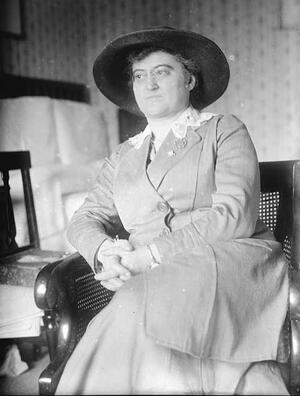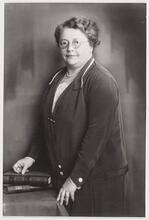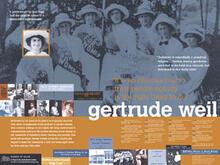Rosika Schwimmer
Rosika Schwimmer earned a reputation as a leading proponent of women’s rights in Hungary before the age of 30. Her uncompromising vision of women’s equality and world peace helped advance the women’s movement but caused costly backlash. In Hungary, she organized women workers, lobbied for marriage reform and birth control, and campaigned against child labor. As press secretary of the International Women’s Suffrage Alliance, she moved to London, where she lobbied for peace at the start of World War I. Schwimmer travelled to America to drum up support for pacifism and suffrage, creating the Women’s Peace Party in 1915. The following year, she persuaded Henry Ford to finance a peace conference in Stockholm. The effort was a failure and Schwimmer was reviled by the press and drew antisemitic and antifeminist backlash.
Rosika Schwimmer was a leader in the international pacifist and feminist movements, a passionate and forceful advocate of pacifism in a time of war. Schwimmer’s career soared during the early twentieth century, but by the 1920s she was caught in the backlash of antifeminism and antisemitism that swept the United States. A complicated and fiery public figure, Schwimmer remained resolute in her political and ideological commitments throughout her controversial career.
Early Life and Political Work
Born on September 11, 1877, in Budapest, Hungary, to Max and Bertha (Katscher) Schwimmer, Rosika Schwimmer grew up in a secular, middle-class Jewish family. She married Paul Bédy, a journalist, in 1911, but the couple divorced after two years. At age eighteen, when her father’s business failed, Schwimmer took a job as a bookkeeper. As a young clerical employee, she began organizing women workers. She founded the National Association of Women Office Workers in 1897, the Hungarian Association of Working Women in 1903, and the Hungarian Council of Women a year later. An advocate of women’s economic, social, and political equality, Schwimmer earned a reputation as a leading proponent of women’s rights in Hungary before she reached age thirty. Schwimmer participated in a host of political campaigns, lobbying for marriage reform and birth control and campaigning against child labor. She organized the Hungarian Feminist Association, which succeeded in winning woman suffrage in 1920. She also edited the Hungarian feminist journal A Nö [The woman] and published works of fiction.
Schwimmer attracted international attention when she addressed the 1904 International Women’s Congress in Berlin, Germany. Later, she became press secretary of the International Woman Suffrage Alliance and moved to London, England, to fulfill her duties.
Pacifist Activism
Schwimmer was living in London when Britain entered World War I in 1914. In addition to her feminist activities, Schwimmer had always been an ardent pacifist. When the European countries declared war, she devoted all of her energies to opposing the war and urging a peaceful settlement. She issued a proposal calling for the neutral nations to meet and formulate a plan for mediation. Shortly after the war began, she traveled to the United States and met with President Woodrow Wilson and Secretary of State William Jennings Bryan, attempting (without success) to convince them to convene a United States–sponsored neutral mediation conference.
Schwimmer spent the early war years in the United States, traveling the country as a lecturer and political activist. Already a well-known public figure, Schwimmer addressed a wide range of constituencies, including Jewish and feminist groups. Carrie Chapman Catt, leader of the American suffrage movement and president of the International Woman Suffrage Alliance, recruited Schwimmer as a speaker and organizer in the campaign for woman suffrage in America. While promoting suffrage, Schwimmer continued to broadcast her opposition to war. In 1915, Schwimmer helped to create the Women’s Peace Party, becoming the organization’s international secretary. At the Hague Congress of Women held later that year, Schwimmer convinced the conference to send representatives to meet with leaders of both neutral and belligerent nations and encourage peaceful mediation. Jane Addams led the delegation to the belligerents, and Schwimmer took responsibility for meeting with leaders of the neutral countries.
The Peace Ship and its Aftermath
When international leaders refused to take action on mediation, Schwimmer began making plans for an unofficial, privately sponsored international meeting. In November 1915, Henry Ford, the leading American automobile manufacturer, agreed to back Schwimmer’s plan. The Ford Neutral Mediation Conference convened in Stockholm on February 8, 1916, with Schwimmer serving as expert adviser. The American delegation sailed to Stockholm on the Oscar II, popularly known as the Peace Ship. The American press published harsh editorials about the Peace Ship Expedition, ridiculing the project and its goals, criticizing the female delegates, and attacking Schwimmer’s leadership. While the press issued its negatively biased reports, the mission suffered several setbacks. Many delegates resented Schwimmer’s authoritative tactics and accused her of financial mismanagement. Henry Ford returned home before the ship reached its destination. As the criticism against her mounted, Schwimmer resigned her position as adviser to the expedition. Schwimmer was indeed a stubborn and uncompromising leader. She focused entirely on the ultimate goal of ending the war and displayed little patience for others who differed with her approach. While her commitment to pacifist goals never wavered, her leadership style alienated many participants, and the press portrayal of her severely damaged her public reputation.
Schwimmer remained in Europe following the Ford Conference and emerged as an active political player after World War I. In November 1918, when her native Hungary became a democratic republic, Schwimmer assumed a post as minister to Switzerland. However, the democratic government lasted only five months, overthrown by Béla Kun’s Communist regime. The new Communist government persecuted Schwimmer and prohibited her from leaving the country. In 1920, she succeeded in escaping to Vienna.
One year later, Rosika Schwimmer gained readmission to the United States. Unlike her first visit, her arrival in 1921 was not met with speaking engagements and public meetings. Schwimmer found her public career destroyed by negative publicity and her former allies in the feminist and suffrage movements unwilling to risk the political consequences of association with her. She was attacked by antifeminist and anticommunist forces. Several right-wing organizations as well as congressional committees accused her of having served as a German spy during the war. At the same time, they charged her with being a Bolshevik agent. In the wake of the right-wing backlash in post–World War I America, Schwimmer was attacked for her feminism, pacifism, and political radicalism. With xenophobia and antisemitism on the rise, she also faced discrimination as a foreigner and a Jew. Jewish groups were hardly more welcoming of Rosika Schwimmer. Following the Peace Ship Expedition and Ford’s subsequent publication of antisemitic literature, the Jewish press had printed several stories indicating that Schwimmer had tricked Ford into sponsoring the Peace Ship, thus inciting his antisemitic hatred.
Later Life and Legacy
Schwimmer petitioned for American citizenship in 1928, but a Chicago federal district court denied her request, citing her refusal to bear arms in defense of the country. As a pacifist, Schwimmer would not agree to the clause in the citizenship application that required such an oath. In 1929, the United States Supreme Court upheld the lower court decision. The Court declared her unworthy of citizenship, not only because she refused to bear arms (despite the fact that women had never been required to fight and she was well beyond the age of conscription), but also because she ardently advocated world government and made her living as a public activist and speaker. Schwimmer never received American citizenship, but lived in the United States as a resident alien until her death in 1948.
Schwimmer continued to work in the feminist and pacifist movements, although she never succeeded in reviving her public reputation or career. She joined Mary Ritter Beard in planning a World Center for Women’s Archives. She also cooperated with her close friend and leading pacifist Lola Maverick Lloyd in sponsoring a Campaign for World Government. Schwimmer retained the ultimate goal of achieving world peace through the creation of a world federation of governments. As an acknowledgment of her work, Schwimmer’s associates awarded her a privately sponsored World Peace Prize. In 1948 she received a nomination for the Nobel Peace Prize.
Schwimmer remained committed to the causes of feminism and pacifism throughout her life. She could be uncompromising and stubborn in pursuing her political goals, traits that earned her devoted allies but also alienated many coworkers. She emerged as one of the most powerful political players in the international feminist and pacifist movements, but she also paid the price for living in an era of right-wing backlash, xenophobia, and antisemitism. Despite her many challenges and setbacks, Rosika Schwimmer never abandoned her unshakable devotion to achieving the goals of world peace and equality.
Rosika Schwimmer died on August 3, 1948.
The American Jewish Woman, 1654–1980, s.v. “Rosika Schwimmer”;
AJYB, 51:524;
American Reformers; BEOAJ;
DAB, Supp. 4;
EJ;
Hershey, Burnet. The Odyssey of Henry Ford and the Great Peace Ship (1967);
Kraft, Barbara S. The Peace Ship: Henry Ford’s Pacifist Adventure in the First World War (1978);
Lee, Albert. Henry Ford and the Jews (1980);
NAW; Rosika Schwimmer, World Patriot (1937. Revised 1947);
Obituary. NYTimes, August 4, 1948, 21:1;
Schwimmer, Rosika. Papers. Hoover Institution, Stanford University, Stanford, Calif., and Rosika Schwimmer-Lola Maverick Lloyd Collection, Rare Books and Manuscripts Division, New York Public Library, NYC;
Steinson, Barbara J. American Women’s Activism in World War I (1982);
UJE;
United States v. Rosika Schwimmer, 279 US 644 (1929);
Wenger, Beth S. “Radical Politics in a Reactionary Age: The Unmaking of Rosika Schwimmer, 1914–1930.” Journal of Women’s History 2, no. 2 (Fall 1990): 66–99;
Wiltsher, Anne. Most Dangerous Women: Feminist Peace Campaigns of the Great War (1985);
WWIAJ (1928, 1938).






